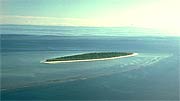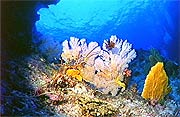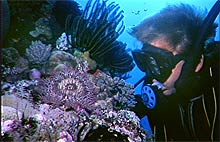Our Great Barrier Reef
Junior Primary Years 1- 3
Preparing to find out:
Sample activities
Photofiles
www support – see: www.gbrmpa.gov.au/corp_site/info_services/library/resources/reef_snapshots/
Collect/download photographs of the Great Barrier Reef Marine Park reserves and/or work and recreational opportunities within them. Students share these and talk about features and activities they recognise. Identify things that are found only on the Great Barrier Reef as opposed to other areas.
Ask students:
- What do we mean by the Great Barrier Reef?
- Why is it important?
- What does it support?
- What plants and animals live on the Reef?
- What is the Reef made of?
- What activities might be undertaken while in and on the waters of the Great Barrier Reef? and
- What can be seen in the photographs that cannot be found in other familiar places?
Make charts of student responses and use these to develop focus questions for the unit. |

Masthead Island and Reef surrounded
by deep blue ocean water

Whip corals, yellow and pink gorgonian fans,
and a deep red feather star
|
| |
|
Class Chart
With the class, prepare a class chart of things students know about the Great Barrier Reef. Students could draw pictures and explain them while the teacher scribes. Prepare a list of questions students want to investigate. Ask students to offer possible answers to these.
Magic Circle
| |
|
Place incomplete statements on cards and place them in a box:
- A reef is…
- Reefs produce food and shelter for…
- We depend on reefs for…
- We snorkel and dive in…
- Corals in reefs are…
- Reef plants…
- Reef animals…
|

Diver examining a Crown-of-thorns starfish |
| |
|
Students can sit in groups of 5 or 7 and take turns to select a card. Read these and ask students to discuss the statement in groups. Students report back some of the information gained.
(Adapted from Hill, S. Games that work – cooperative Games and Activities for the Primary School Classroom, Eleanor Curtin, 1992).
Next - Finding Out:
Sample activities |